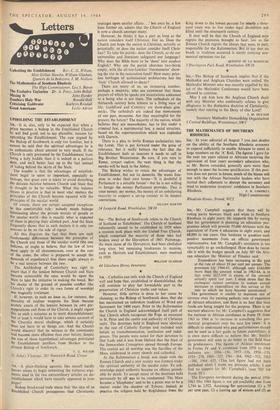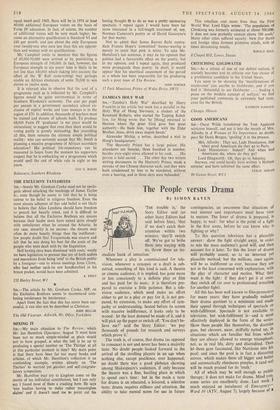SIR,—Mr. Campbell suggests that there will be voting parity between
black and white in Southern Rhodesia in eight years. He supports this by saying that his government is planning an education pro- gramme which will provide 55,000 Africans with the equivalent of Form 4 education in eight years, and 68,000 in ten years. One hesitates to question such positive statements from an official government representative, but Mr. Campbell's revelation is too remarkable to go unchallenged. How does he recon- cile it with the budget speech on July 30? On Afri- can education the Minister of Finance said:
Expenditure has been increasing in the past at the rate of about 10 per cent per annum. The provision for 1964-65, although only £340,000 more than the amount voted in 1963-64, is in fact some 025,000 in excess of the amount actually spent last year. I must stress that the exchequer cannot continue to sustain annual increases in expenditure on this service at the rate to which we have become accustomed.
The government is unable to maintain out of revenue even the existing pathetic rate of expansion s of African education, and there is no hint that loan funds are being sought for the purpose. There is no warrant whatever for Mr. Campbell's suggestion that the increase in African enrolment in Form IV from 1963 to 1964 is 'to increase in something like geo- metrical progression over the next few years.' It is difficult to understand why past performances should not be used as a fair guide to future capabilities; it is even more difficult to believe that Mr. Smith's government will wish to do better in this field than its predecessors. The figures of African enrolment in Forms IV and V combined from 1956 to 1964 inclusive are: 1956-156, 1957-136, 1958-150, 1959--278, 1960-325, 1961-364, 1962-352, 1963 —386, 1964-655. (This last figure had not been published when I wrote my previous article; I can find no support for Mr. Campbell's 'over 700' for Form IV.)
The European enrolment during the period 1956- 1963 (the 1964 figure is not yet available) rose from 1,744 to 3,922. Assuming for convenience (1) a 75 per cent pass, (2) a leaving age of sixteen and (3) an
equal trend until 1969, there will be in 1974 at least 40,000 additional European voters on the basis of Form IV education. In fact, of course, the number of additional voters will be very much higher, be- cause an alternative qualification is Standard VI and £40 per month, and just about the only Europeans over twenty-one who earn less than this are appren- tices and women with no qualifications.
Mr. Campbell omits to mention that the figures of 65,000-70,000 were arrived at by postulating a European strength of 100,000. In fact, however, the European strength in ten years' time is likely to be not less than 140,000 which (taking into account the effect of the 'B' Roll cross-voting) may perhaps enable an African electorate of some 70,000 to win eleven or twelve seats.
It is relevant also to observe that the cost of a programme such as is indicated by Mr. Campbell's figures would be quite astronomical in terms of Southern Rhodesia's economy. The cost per pupil per annum in a government secondary school ex- clusive of capital works and loan moneys is in the region of £70. In addition, thousands of teachers must be trained and dozens of schools built. To produce 68,000 Form IV 'graduates' in ten years would be miraculous; to suggest that even then there would be voting parity is grossly misleading. But overriding all this, there remains the ultimate simple political reality: who can seriously accept that Mr. Smith is planning a massive programme of African secondary education? His political life-expectancy can be measured in hours from the moment his supporters suspect that he is embarking on a programme which would spell the end of white rule in eight or ten years.
Bulawayo, Southern Rhodesia
LEO S. BARON





























 Previous page
Previous page